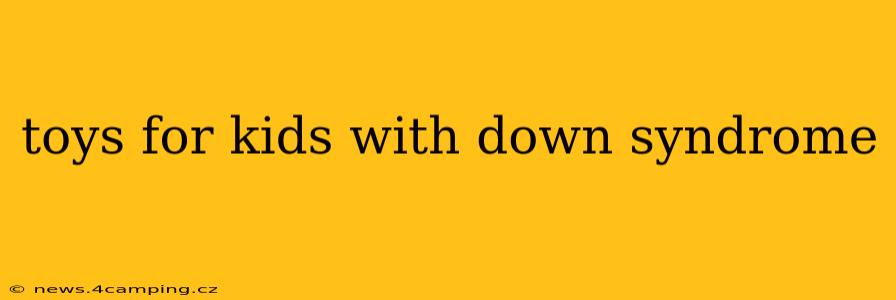Choosing the right toys for children with Down syndrome is crucial for supporting their development and encouraging play. While every child is unique, understanding their developmental milestones and potential challenges can help parents and caregivers select toys that are both engaging and beneficial. This guide explores various toy categories, considering the specific needs and abilities often associated with Down syndrome.
What are the developmental considerations when choosing toys for children with Down syndrome?
Children with Down syndrome may experience developmental delays in various areas, including motor skills, language, and cognitive abilities. However, the degree of delay varies greatly from child to child. When choosing toys, consider the child's individual abilities and developmental stage rather than focusing solely on their diagnosis. Focus on toys that promote:
- Fine motor skills: These skills involve the small muscles in the hands and fingers. Toys like building blocks, puzzles, and playdough are excellent for improving dexterity and hand-eye coordination.
- Gross motor skills: These involve the larger muscles in the arms and legs. Toys that encourage movement, such as balls, ride-on toys, and climbing equipment, are beneficial.
- Cognitive development: Toys that stimulate problem-solving, memory, and attention span, such as shape sorters, matching games, and simple board games, are ideal.
- Language development: Toys that encourage communication and language skills, like interactive books, puppets, and singing toys, are highly valuable.
- Sensory exploration: Toys that provide varied sensory experiences, such as textured balls, musical instruments, and water play toys, can be incredibly engaging and stimulating.
What types of toys are best for kids with Down syndrome?
There's no single "best" toy, but focusing on certain types can be particularly beneficial.
Toys that encourage sensory exploration:
These are crucial because many children with Down syndrome have heightened or diminished sensory sensitivities. Examples include:
- Textured balls: Different textures stimulate tactile senses.
- Musical instruments: Develop rhythm and coordination.
- Water tables: Provide a calming and engaging sensory experience.
- Light-up toys: Capture attention and stimulate visual senses.
Toys that promote fine motor skills:
Developing fine motor skills is often a focus for children with Down syndrome. Consider:
- Building blocks: Develop hand-eye coordination and problem-solving skills.
- Puzzles: Enhance problem-solving and spatial reasoning.
- Playdough: Improves hand strength and dexterity.
- Finger puppets: Encourage hand manipulation and imaginative play.
Toys that support gross motor skills:
These toys promote physical development and coordination:
- Balls: Encourage throwing, catching, and rolling skills.
- Ride-on toys: Improve balance and coordination.
- Climbing equipment: Develop strength and coordination.
- Tricycles or bicycles: Develop gross motor skills and coordination.
Toys that foster cognitive development:
Cognitive skills are crucial, and these toys help develop them:
- Shape sorters: Improve problem-solving and spatial reasoning.
- Matching games: Enhance memory and cognitive skills.
- Simple board games: Develop turn-taking and strategic thinking.
- Picture cards: Help with language and memory association.
Toys that enhance language development:
Communication is key, and these toys support language acquisition:
- Interactive books: Engage children and encourage language participation.
- Puppets: Stimulate imaginative play and conversation.
- Singing toys: Introduce new vocabulary and language patterns.
- Talking toys: Expand vocabulary and encourage interaction.
Are there specific brands or types of toys to avoid?
There aren't specific brands to avoid, but it's crucial to prioritize safety and age-appropriateness. Avoid toys with small parts that could pose a choking hazard. Always supervise young children during playtime. Opt for durable and well-made toys that can withstand enthusiastic play.
How can I adapt toys to meet a child's specific needs?
Adapting toys can significantly enhance a child's ability to engage with them. For example:
- Simplify complex toys: Remove unnecessary parts or modify rules to make games easier.
- Use adaptive equipment: Consider using adapted grips or switches to help a child manipulate toys.
- Provide physical support: Offer assistance when necessary, gradually reducing support as the child gains independence.
- Focus on the child's strengths: Choose toys that capitalize on the child's existing skills and interests.
What resources are available for parents and caregivers?
Many organizations offer support and resources for parents of children with Down syndrome. These resources can provide guidance on toy selection, developmental milestones, and other relevant topics. Consult your pediatrician or a specialist for personalized recommendations.
Remember, the goal is to choose toys that are fun, engaging, and promote the child's overall development. Observe your child's reactions and preferences to tailor toy selection to their individual needs and interests. Enjoy the playtime!
